The Facebook and WhatsApp applications' icons. Photograph: Gabriel Bouys/AFP/Getty pictures
Facebook’s $19bn acquisition of WhatsApp in the week will far more than live the breadth of Mark Zuckerberg’s defrayal power and his company’s ambition. It ought to highlight however necessary one amongst the foremost basic varieties of electronic communication – electronic communication – is to the internet’s future.
Here’s the primary issue regarding all of this you must know: whereas US corporations clearly have vital buying power, yank startups area unit in some ways that behind the world curve; abundant of the innovation is going on thousands of miles faraway from Menlo Park. And here’s the second thing: WhatsApp’s competitors build its current revenue model look very, very sluggish.
Messaging is attractive for many reasons. For one, it’s a medium employed by individuals everywhere the globe. for one more, it’s quieter; messages deliver a stream of photos, video or easy text direct from wanted ones, while not the further noise of everybody else on the web. Messages give for the quickest approach for individuals to attach or realize one another in a very crowd. And messages enable individuals to shop for stuff – heaps and plenty of stuff – in associate degree virtually reprehensively seamless manner.
Consider the subsequent a a hundred and one guide to a number of the electronic communication apps you'll not have detected regarding, together with a quick refresher on WhatsApp. These apps give services that WhatsApp/Facebook could hope to emulate within the race to create cash and virtually monopolize the world’s attention. (And if that sounds creepy, that’s as a result of it variety of is. The Guardian’s Dan Gilmor takes a glance at a world wherever Zuckerberg, not public utility suppliers, dominate communication.)
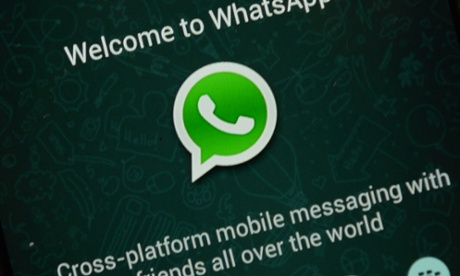 App: WhatsApp
App: WhatsApp
Short span version: Born and bred in geographical region by 2 ex-Yahoo staff, this app registers 1,000,000 new users per day, and 450m users per month use the service to send text, ikon and video. And currently it’s price lots of cash.
WhatsApp, the electronic communication service bought by Facebook for $19bn. Photograph: Stan Honda/AFP/Getty pictures
Where it’s popular: Europe – up to eightieth penetration in countries together with Brazil, Germany, Portuguese Republic and European nation – and geographic region, India
Numbers: $19bm is that the solely range anyone’s being attentive to at the instant
Why it’s price watching: See on top of. Also, WhatsApp’s revenue strategy ($1 when a year of free use) appearance particularly sluggish compared to different apps giving similar services.
More reading: priest Rushe’s breaking story on the acquisition additionally has nice background on founders’ visions for the tool – and a lot of numbers, if you wish them.
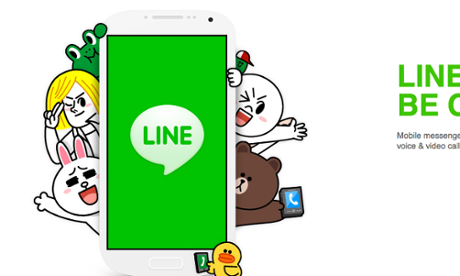 App: Line
App: Line
Short span version: Line was developed in Japan when phone communication unsuccessful because of the 2011 tidal wave. Users will use text, photo, video and sticker emoticons to speak. Users also can obtain things, and makes should buy stickers that users will send to every different without charge.
Line app. Photograph: /Line
Where it’s popular: Japan, Thailand, Spain
Numbers: roughly 300m users, solely 50m of them in Japan
Why it’s price watching: Line has created cash merchandising sticker emoticons and games – shortly from the kinds of diversions you’d realize on Facebook. This month, experiments with “flash sales” in Kingdom of Thailand resulted in five.5m out of the country’s 22m total Line users linguistic communication up to shop for discounted food and cosmetics.
These were technically ads, however clearly not invasive enough that build individuals bristle. this might be a massively instructive move for WhatsApp. And, oh yeah, Line is claimed to be considering a remote initial public offering this year, that analysts say might place the worth of the corporate around $10bn.
More reading: mountain Thompson has a wonderful deep dive into Line’s flash sales and stickers strategy at Stratechery.
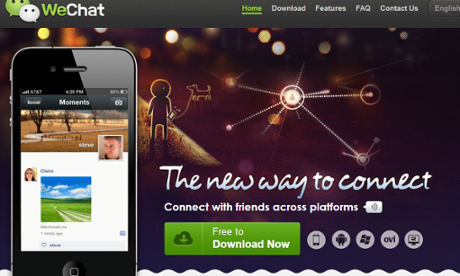 App: WeChat
App: WeChat
Short span version: Developed in China (the world’s largest telecommunications market), WeChat is closely-held by Tencent, a web service supplier that has monopolized the market and set sights on the west.
WeChat app. Photograph: /WeChat
Where it’s popular: South-east Asia, African nation, Russia, India
Numbers: roughly 300m users; expected to earn $1.1bn next year
Why it’s price watching: very similar to Line, WeChat has already found out the way to provoke users into linking the service to their bank accounts for purchases, that embrace shopping for new smartphones, through special promotions. It’ll even be fascinating to envision if WeChat will crack western markets by, within the words of the economic expert, persuading “consumers living in free societies to use a social network actively monitored by associate degree authoritarian regime”.
More reading: Quartz includes a nice explainer on WeChat’s ability to retain users and keep them inside the app.
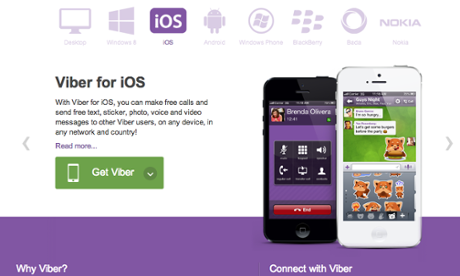 App: Viber
App: Viber
Short span version: operative out of Cyprus, this one’s just about just like the others, however with a lot of of a stress on the sort of electronic communication you are doing along with your actual voice. within the past days we tend to wont to decision this “phone calls” or “Skyping”. Viber was purchased for relative peanuts ($900m) last week by Japanese comms large Rakuten.
Viber. Photograph: /Viber
Where it’s popular: It’s employed in 193 countries – everywhere?
Numbers: Reportedly losing cash to the tune of $29.5m last year, however has roughly 300m users.
Why it’s price watching: very similar to Facebook, Rakuten is seeking to expand its empire by broadening its profile of services. however Rakuten an internet retail company (think Amazon status), therefore it’ll be fascinating to envision what it will with Viber’s wide user reach and a sticker-based communication model almost like Line’s
More reading: selection has drawn some nice comparisons to the WhatsApp deal here
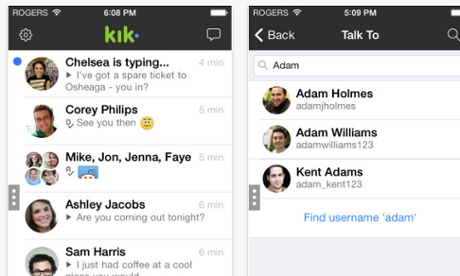 App: Kik courier
App: Kik courier
Short span version: Created at the University of Waterloo, this courier simply launched associate degree in-app browser. and youths love the tool, one amongst many signals that consequent generation are a lot of into direct electronic communication than millennials. it's yielded many another “parents beware” journal post.
Kik courier. Photograph: /Kik courier
Where it’s popular: The US and North American nation
Numbers: roughly 100m users; raised $19.5m price of funding in 2013
Why it’s price watching: Kik is creating a giant push to retain users within the app for abundant of their net browsing and social sharing expertise.
Facebook’s $19bn acquisition of WhatsApp in the week will far more than live the breadth of Mark Zuckerberg’s defrayal power and his company’s ambition. It ought to highlight however necessary one amongst the foremost basic varieties of electronic communication – electronic communication – is to the internet’s future.
Here’s the primary issue regarding all of this you must know: whereas US corporations clearly have vital buying power, yank startups area unit in some ways that behind the world curve; abundant of the innovation is going on thousands of miles faraway from Menlo Park. And here’s the second thing: WhatsApp’s competitors build its current revenue model look very, very sluggish.
Messaging is attractive for many reasons. For one, it’s a medium employed by individuals everywhere the globe. for one more, it’s quieter; messages deliver a stream of photos, video or easy text direct from wanted ones, while not the further noise of everybody else on the web. Messages give for the quickest approach for individuals to attach or realize one another in a very crowd. And messages enable individuals to shop for stuff – heaps and plenty of stuff – in associate degree virtually reprehensively seamless manner.
Consider the subsequent a a hundred and one guide to a number of the electronic communication apps you'll not have detected regarding, together with a quick refresher on WhatsApp. These apps give services that WhatsApp/Facebook could hope to emulate within the race to create cash and virtually monopolize the world’s attention. (And if that sounds creepy, that’s as a result of it variety of is. The Guardian’s Dan Gilmor takes a glance at a world wherever Zuckerberg, not public utility suppliers, dominate communication.)
 App: WhatsApp
App: WhatsAppShort span version: Born and bred in geographical region by 2 ex-Yahoo staff, this app registers 1,000,000 new users per day, and 450m users per month use the service to send text, ikon and video. And currently it’s price lots of cash.
WhatsApp, the electronic communication service bought by Facebook for $19bn. Photograph: Stan Honda/AFP/Getty pictures
Where it’s popular: Europe – up to eightieth penetration in countries together with Brazil, Germany, Portuguese Republic and European nation – and geographic region, India
Numbers: $19bm is that the solely range anyone’s being attentive to at the instant
Why it’s price watching: See on top of. Also, WhatsApp’s revenue strategy ($1 when a year of free use) appearance particularly sluggish compared to different apps giving similar services.
More reading: priest Rushe’s breaking story on the acquisition additionally has nice background on founders’ visions for the tool – and a lot of numbers, if you wish them.
 App: Line
App: LineShort span version: Line was developed in Japan when phone communication unsuccessful because of the 2011 tidal wave. Users will use text, photo, video and sticker emoticons to speak. Users also can obtain things, and makes should buy stickers that users will send to every different without charge.
Line app. Photograph: /Line
Where it’s popular: Japan, Thailand, Spain
Numbers: roughly 300m users, solely 50m of them in Japan
Why it’s price watching: Line has created cash merchandising sticker emoticons and games – shortly from the kinds of diversions you’d realize on Facebook. This month, experiments with “flash sales” in Kingdom of Thailand resulted in five.5m out of the country’s 22m total Line users linguistic communication up to shop for discounted food and cosmetics.
These were technically ads, however clearly not invasive enough that build individuals bristle. this might be a massively instructive move for WhatsApp. And, oh yeah, Line is claimed to be considering a remote initial public offering this year, that analysts say might place the worth of the corporate around $10bn.
More reading: mountain Thompson has a wonderful deep dive into Line’s flash sales and stickers strategy at Stratechery.
 App: WeChat
App: WeChatShort span version: Developed in China (the world’s largest telecommunications market), WeChat is closely-held by Tencent, a web service supplier that has monopolized the market and set sights on the west.
WeChat app. Photograph: /WeChat
Where it’s popular: South-east Asia, African nation, Russia, India
Numbers: roughly 300m users; expected to earn $1.1bn next year
Why it’s price watching: very similar to Line, WeChat has already found out the way to provoke users into linking the service to their bank accounts for purchases, that embrace shopping for new smartphones, through special promotions. It’ll even be fascinating to envision if WeChat will crack western markets by, within the words of the economic expert, persuading “consumers living in free societies to use a social network actively monitored by associate degree authoritarian regime”.
More reading: Quartz includes a nice explainer on WeChat’s ability to retain users and keep them inside the app.
 App: Viber
App: ViberShort span version: operative out of Cyprus, this one’s just about just like the others, however with a lot of of a stress on the sort of electronic communication you are doing along with your actual voice. within the past days we tend to wont to decision this “phone calls” or “Skyping”. Viber was purchased for relative peanuts ($900m) last week by Japanese comms large Rakuten.
Viber. Photograph: /Viber
Where it’s popular: It’s employed in 193 countries – everywhere?
Numbers: Reportedly losing cash to the tune of $29.5m last year, however has roughly 300m users.
Why it’s price watching: very similar to Facebook, Rakuten is seeking to expand its empire by broadening its profile of services. however Rakuten an internet retail company (think Amazon status), therefore it’ll be fascinating to envision what it will with Viber’s wide user reach and a sticker-based communication model almost like Line’s
More reading: selection has drawn some nice comparisons to the WhatsApp deal here
 App: Kik courier
App: Kik courierShort span version: Created at the University of Waterloo, this courier simply launched associate degree in-app browser. and youths love the tool, one amongst many signals that consequent generation are a lot of into direct electronic communication than millennials. it's yielded many another “parents beware” journal post.
Kik courier. Photograph: /Kik courier
Where it’s popular: The US and North American nation
Numbers: roughly 100m users; raised $19.5m price of funding in 2013
Why it’s price watching: Kik is creating a giant push to retain users within the app for abundant of their net browsing and social sharing expertise.
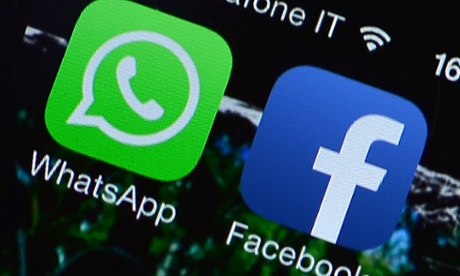
No comments:
Post a Comment